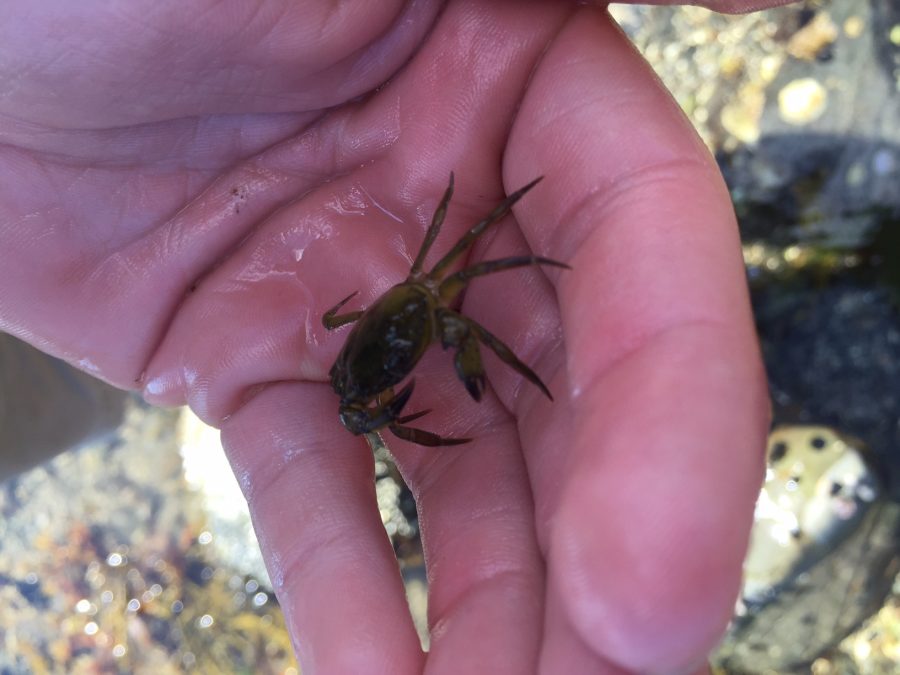The Gulf of Maine is in Hot Water
Maine’s Biggest Environmental Problem
An invasive green crab found at Gooch’s Beach.
Things are heating up in the Gulf of Maine. Literally. The gulf is the second fastest warming body of water in the world, causing concerns for fishermen and lobstermen, and more importantly, the environment.
The Gulf of Maine is warming because the deep water currents that feed it have changed as a result of global warming. This should concern us a great deal as Mainers. With the temperature of the water rising, our native species that thrive in cold water cannot survive here, and many of them are leaving. Lobsters, Maine’s livelihood, are moving North and further out to sea. Commercially important fish are also moving towards the deep Southwestern waters of the Gulf that remain cooler. Mussel beds and soft-shell clams are perishing as a result of ocean acidification. Puffins are suffering extreme loss of life, as their food sources are moving away with the cold water. When I asked environmental science teacher, Ms. Luetje, on how she felt about this issue, she said, ¨Everything in the Gulf is our natural resource. Whether it’s for tourism, for food, (or) for energy. So if we don’t treat things correctly…the life that we know now isn’t gonna be the life that our children and our grandchildren have on the Gulf of Maine.¨
When people think of Maine, they think of lobster and seafood, which makes up much of our business. As these organisms leave, Maine’s economy will suffer. It already has, with Maine’s Northern Shrimp Fishery being closed three seasons in a row due to the lack of shrimp. Lobstermen are also having trouble, having to spend more money and put in longer hours in order to catch the retreating lobsters. Not to mention that lobsters aren’t the only things showing up in traps. With the warming temperatures, blue crabs (native to the coasts of Maryland and Rhode Island) have been showing up in lobster traps.
Even more concerning is that invasive species are thriving in the warming water. Sea squirts and Asian shore crabs are taking larger holds than before. They take away resources from native species, worsening an already dire situation for endemic organisms.
Perhaps the most recognizable invader is the green crab. Lift up any rock at Gooch’s beach and you have a likely chance of finding one. They may look harmless, but in reality, they have caused a significant amount of damage to the Maine coastline. Because green crabs can survive in waters anywhere from 30-88°F, live in various salinity levels, and lack any natural predators in our ecosystem, they are able to reproduce at rapid paces. Originally, the harsh Maine winters kept the green crab population under control. But with climate change, their populations have exploded in the past few years. Mussel beds have completely disappeared as a result. Now, these crabs are attacking soft-shell clams because they devastated the mussel population. Green crabs have also destroyed meadows of eelgrass, which many indigenous organisms call home. These invasive crustaceans will continue to eat their way through Maine’s wildlife with climate change as their aid.
However, the scariest thing for Mainers is that climate change models show that the problem will only get worse. The water will continue to warm. Invasive species will continue to thrive. Native fish, crustaceans, birds, and other wildlife will have no choice but to leave. Many marine-based businesses will have no choice but to follow them or close. The environment at sea, and on shore, will drastically change for all of us.
There is one thing we can do, as Mainers who love and respect our coast. We have a voice. We have the ability to speak up for the native fish, crustaceans, birds, and wildlife that can’t cry for help. We can look to our government, our scientists, and our businesses to demand change and work together to find solutions. We have the choice to fight for the Gulf of Maine. In the words of Ms. Luetje, ¨Be scientifically literate and make good decisions about how you live your life, and damn it, vote!¨
“War on Invasive Green Crabs.” Maine Clammers. Maine Clammers Association, 2016. Web. 8 Oct. 2016.
Woodard, Colin. “Mayday: Gulf of Maine in Distress.” Portland Press Herald. Portland Press Herald, 25 Oct. 2015. Web. 9 Oct. 2016.

